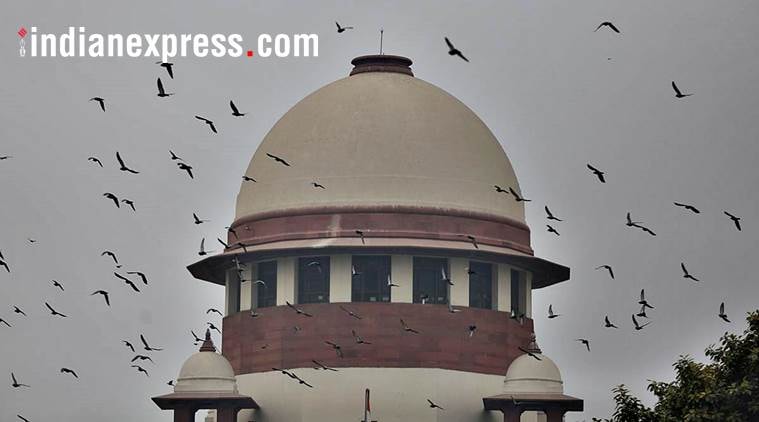Stay updated with the latest - Click here to follow us on Instagram
Can 3-judge bench reject 3-judge bench order? Supreme Court to check
The Supreme Court also requested its own other benches 'dealing with similar matters relating to defer the hearing' till it took a decision on referring it.
 The bench asked the Secretary-General to ‘urgently communicate this order to the Registrar General of every High Court so that our request is complied with’. (File Photo)
The bench asked the Secretary-General to ‘urgently communicate this order to the Registrar General of every High Court so that our request is complied with’. (File Photo)
Raising questions of propriety after a three-judge bench held the decision of another three-judge bench wrong, the Supreme Court Wednesday virtually stayed the operation of its February 8 order related to land acquisition till it decided if the matter needed to be referred to a larger bench. “We are of the opinion that it would be appropriate if in the interim and pending a final decision on making a reference (if at all) to a larger Bench, the High Courts be requested not to deal with any cases relating to the interpretation of or concerning Section 24 of the Right to Fair Compensation and Transparency in Land Acquisition, Rehabilitation and Resettlement Act, 2013,” a three-judge bench of Justices Madan B Lokur, Kurian Joseph and Deepak Gupta said.
The bench asked the Secretary-General to “urgently communicate this order to the Registrar General of every High Court so that our request is complied with”. The court also requested its own other benches “dealing with similar matters to defer the hearing” till it took a decision on referring it. On February 8, a three-judge bench comprising Justices Arun Mishra, A K Goel and Mohan M Shantanagoudar had held that compensation not availed within a stipulated five-year period would not be grounds for cancellation of land acquisition. In arriving at this conclusion, the Justice Mishra-led bench had, by a majority of 2:1, held a 2014 verdict in a case related to the Pune Municipal Corporation as “per incuriam” (passed without due regard to the law).
The 2014 verdict, rendered unanimously by a three-judge bench comprising former Chief Justice R M Lodha, Justices Kurian Joseph and M B Lokur, had said that non-payment of compensation would constitute grounds to cancel the land acquisition. “Be very clear, this is a matter of judicial discipline, judicial propriety and consistency. Can a three-judge bench overrule a three-judge bench verdict? It has to be referred to a larger bench in case of difference of opinion,” Justice Joseph said on Wednesday.
He said that “correctness of judgement can be doubted but the bench of similar strength of judges cannot ‘hold’ that the judgement rendered by the earlier one was wrong. Such a system works on hierarchy and it needs to be preserved”. “The system exists but if you start tinkering with it then it won’t stop. This institution will go forever. There has to be wisdom and a proper method has to be followed. Every institution works on particular methodology,” he observed.
Justice Joseph said it was his “painful concern” that “if this court is to remain as one, it should be one and you have to make it one. You have to have proper judicial discipline for that”. The bench said it would not comment on the merits of the matter. Senior advocate Mukul Rohatgi, who questioned the February 8 verdict, said that another bench of the court had been dismissing pending land acquisition cases on the basis of this judgment. He said, “When one of the judge has differed on the point of holding the 2014 verdict as per incuriam, then this matter should be have been referred to a larger bench. That’s the judicial discipline adopted by apex court.”
The February 8 judgment had held that once compensation for land acquired by a government agency had been unconditionally tendered but was refused by the land owner, it would amount to payment and discharge of obligation on part of the agency. The 2014 verdict had said that “the deposit of compensation amount in the government treasury is of no avail and cannot be held to be equivalent to compensation paid to the landowners/persons interested”.







